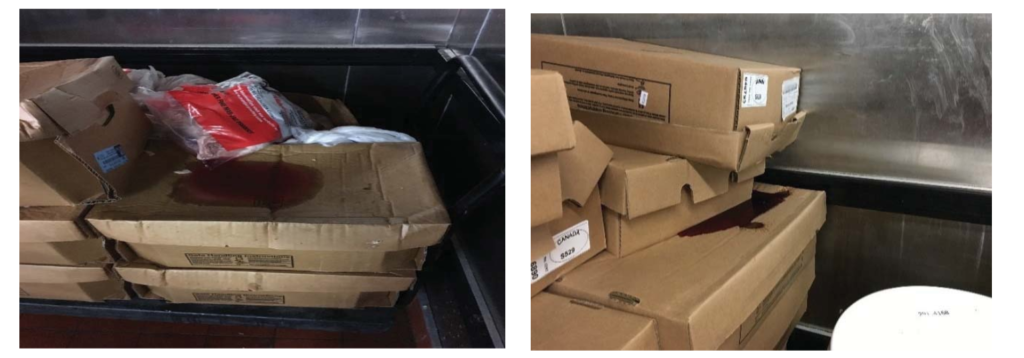Introduction
A Newark, New Jersey immigrant detention center has been feeding detainees moldy, spoiled and foul-smelling food — an abuse that’s led detainees to file scores of grievances and to report symptoms of food poisoning, according to a report released Friday by the Department of Homeland Security’s Inspector General.
The center, which can house more than 900 men, is run by the Essex County Department of Corrections, under an agreement with U.S. Immigration and Customs Enforcement, or ICE. DHS inspectors conducted a surprise visit last July and found multiple health-and-safety violations of detainee rights and ICE standards. The inspector general’s report noted that the Essex County Correctional Facility also failed to disclose to ICE, as required, incidents involving fights among detainees and hospitalization of detainees for mental illness.
A detainee also found a loaded gun belonging to a guard in a bathroom, the inspector general’s report said. Center staff admitted to inspectors that they told the detainee who found the gun “not to discuss the matter with anyone,” according to inspectors.
In the report, inspectors noted that detainees filed about 200 grievances about food quality during the first six months of 2018.
“For dinner, we were served meatballs that smelled like fecal matter,” one detainee wrote.
“The food that we received has been complete garbage,” another wrote. He also wrote: “I have a stomach infection because of it and the nurse herself told me it was caused by the food.”

Slimy and discolored lunch meat stored without any labels (at left).
Hamburger patty served to detainees that was foul smelling and unrecognizable (at
right). Observed by inspectors at the Essex facility last July.
Inspectors observed “expired and moldy bread” in a refrigerator, despite requirements that staff toss it out. “The food handling in general was so substandard that ICE and facility leadership had the kitchen manager replaced during our inspection,” inspectors reported.
ICE asserted that after seeing a draft of the report its officials “immediately initiated a follow-up review process” at the Essex facility. ICE and Essex detention officials could not be reached for comment. But WNYC radio in New York reported that ICE, in a statement, said that conditions inside Essex had improved and that ICE was “committed to continually enhancing” detention operations to promote “a safe and secure environment.”
WNYC also reported that Al Ortiz, director of the Essex facility, said in a statement that detention center has “taken steps to address and rectify the conditions.”
The inspector general additionally detailed how inspectors last July found showers at Essex covered with mold. Staff had placed trash cans under holes in ceilings to collect rain leaking in; two leaks were in detainee rooms right over their beds. When inspectors asked guards about decaying mattresses they observed, the report says, guards said they “wait for detainees to complain” before staff put in a request that mattresses be replaced.

Observed by inspectors at the Essex facility last July.
The Newark immigration detention center isn’t the first facility where DHS inspectors have found neglect and substandard conditions.
In October, a DHS inspector general report found violations at the Adelanto detention center in California that included inappropriate handcuffing and shackling of detainees and medical neglect, as the Center for Public Integrity reported. A dentist employed at Adelanto, which is operated by the private GEO Group, Inc., told inspectors that detainees could use strings from their socks to floss their teeth if dental floss was not available to them. Inspectors also found evidence that a disabled detainee in a wheelchair was placed into “segregation,” or isolation, for nine days, during which time he was unable to sleep in a bed or brush his teeth.
In January, another DHS inspector general report accused ICE of issuing only two penalties against contractors holding immigrant detainees despite finding 14,000 violations of detainee rights and ICE standards. The violations were found at 106 contract detention centers from 2015 to 2018. Violations included contractors’ failure to report alleged sexual assaults to ICE. Last September, the Center reported on private-prison companies’ history, and allegations of abuses that include medical neglect.
Read more in Inequality, Opportunity and Poverty
Immigration Decoded
Babies in poor health at ICE-run detention facility, says complaint
Advocacy groups want mom and kids released from Dilley, Texas center; government says comprehensive care is being provided.
Immigration Decoded
Americans’ immigration emergency: Their spouses could be deported, or exiled
With kids in tow, U.S. citizens visit Congress to plead for help.

Join the conversation
Show Comments